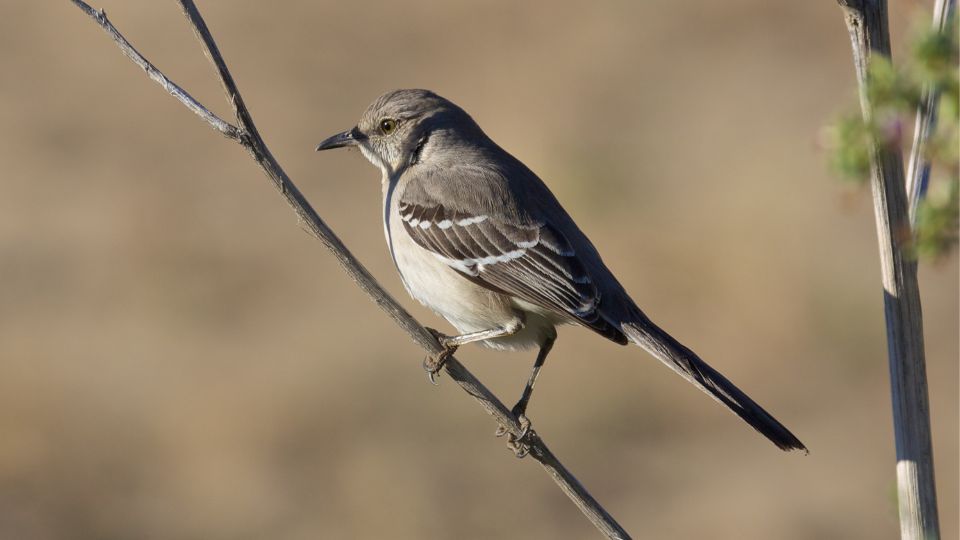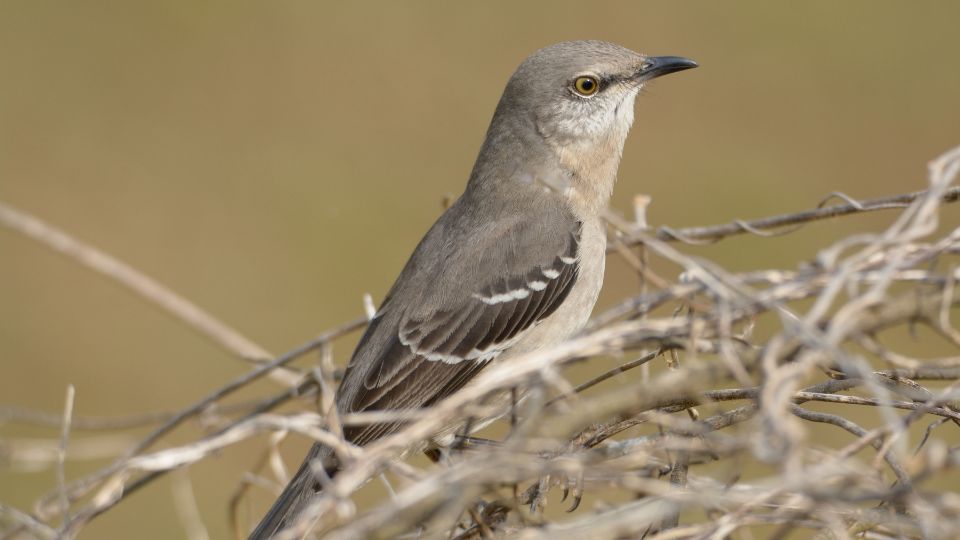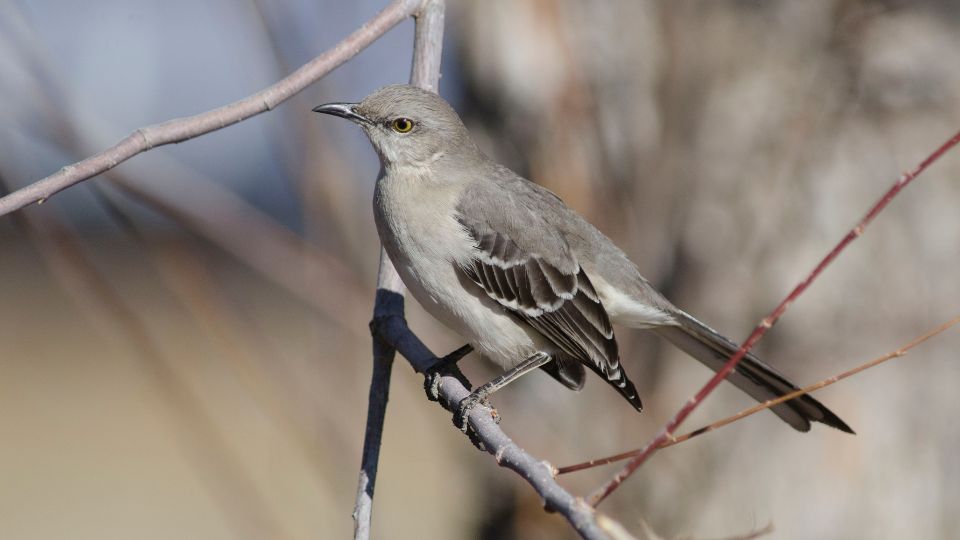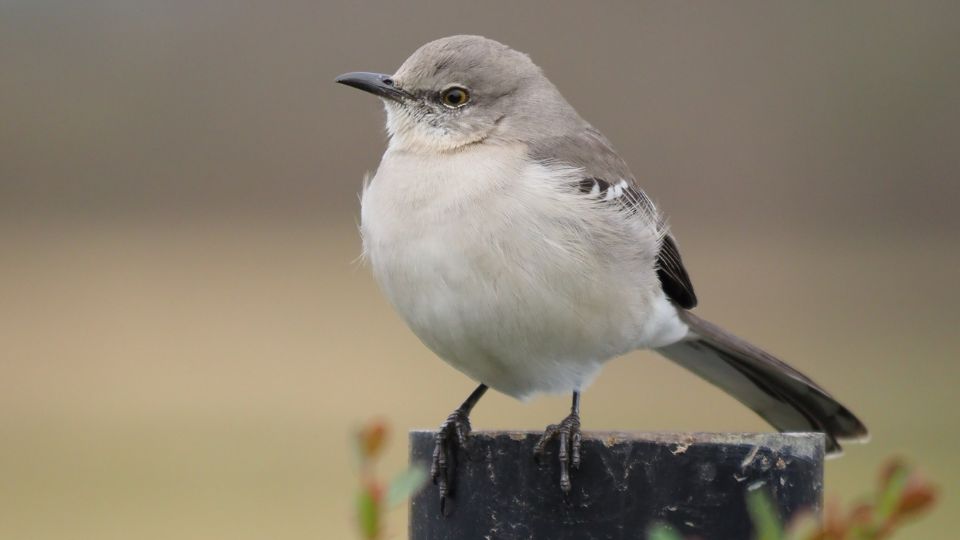The mockingbird call incorporates up to 200 different songbird songs (and other things like car alarms) into their repertoire. The mockingbird songs include whistles, rasps, trills, and scolds. Mockingbirds are known to notoriously sing throughout the night, when they are in search of a mate.
Mockingbirds are prolific imitators, but have you ever wondered why they imitate other birds? While they have a few sounds of their own, they are often heard mimicking other songbirds, sometimes long into the evening!
Check out below why they mimic other birds and if they have any original tunes of their own.
What Does A Mockingbird Sound like?
Adult mockingbirds can vocalize up to 200 different notes, both original and copies from other avain speices.
These noises can include noises that sound like sharp rasps, short bursts of trills, and loud scolds. Typically, mockingbirds that have not yet paired with another bird will sing late into the night.
The scientific name for the mockingbird is Mimus polyglottos, which translates to ‘mimic of many tongues’. While other birds in the Mimidae family (such as catbirds and thrashers) are highly vocal and skilled, the mockingbird call is more prolific.
We know that they often mock other songbirds, but what other songs and sounds do Mockingbirds make, and what do they mean?
In the video below, we rounded up 10 of the most fascinating facts about Mockingbirds!
Does a Mockingbird Mimic Other Birds?
Yes! Not only does the Northern Mockingbird mimic other bird sounds, but they also mimic things like car alarms, horns, and squeaky iron gates. These clever mimics imitate up to 200 sounds, and they do so to get the attention of a mate.
Mockingbirds often mimic the songs of other songbirds such as the Tufted Titmouse, Blue Jay, Northern Cardinal, and Bluebirds. Sometimes, Mockingbirds living in residential neighborhoods also mistake the sounds of a car alarm for songbirds and mimic these sounds!
It’s also important to note that Mockingbirds aren’t the only birds that use mimicry to attract a mate. Other birds in the Mimidae family, such as the Catbird, Brown Thrasher, and Blackbirds, are also excellent avian mockers.

Why Do Mockingbirds Sing at Night?
If you hear a Mockingbird singing at night, it’s because they don’t quit their hunt for a mate after the sun goes down!
The Mockingbird is the only songbird that sings 24 hours a day. If a desperate mate still hasn’t found a mate during the breeding season, it continues to sing well into the night and early morning.
It’s not super common, but it happens from time to time. When a Mockingbird starts to get desperate, it stays up all night signing in hopes that its solo song in the quietness of the night will catch the ear of a lonely female Mockingbird.

What is the Natural Sound of a Mockingbird?
Mockingbirds also have a series of sounds that are unique to them. An average Mockingbird song includes a series of songs from different birds, often lasting up to 2 minutes. Between each imitation, they incorporate filler buzzes, warbles, and chirps.
If you are unsure if it’s a mockingbird singing outside your window, they also have a distinctive chewp note unique to only mockingbirds. They’re famous for their imitations but also have a few calls that are unique only to Mockingbirds.
Various Mockingbird Sounds and What They Mean
The northern mockingbird is a prolific Mimidae but has a few unique calls. These sounds vary, whether they chase off predators or talk among themselves during incubation.
Mating
During mating season, male mockingbirds are prolific vocalizers that mimic up to 200 sounds. Older mockingbirds often have more songs in their repertoire than younger birds. If you hear a mockingbird singing with only a few songs, odds are it’s a young mockingbird.
Mimicked songs typically mimic short phrases of blackbirds, blue jays, and oriels that repeat 2-6 times before moving on to a different tune. Between songs, they incorporate filler sounds like chirps, warbles, and buzzes before moving on to another piece.
The more songs a mockingbird adds into its one-minute song, the more likely it is to snag a mate.
Warning Calls
If a predator is nearby or a mockingbird feels threatened (either by a predator or other Mockingbirds), it emits a chat call that sounds dry and scratchy. Males make up to 8 dry sounds when alarmed, while females only emit one chirp or trill when disturbed.
Incubation Period
When a pair of male and female mockingbirds build a nest together, they have a very soft and specific series of chirps to communicate. It sounds very similar to the dry chirps made when chasing off predators, but it is much quieter and reserved when talking to each other.

How Many Sounds does a Mockingbird Make?
The more songs a male mockingbird learns, the more likely it is to snag a mate.
It’s difficult to recreate the sounds of other birds, and female mockingbirds are impressed by the number of songs a male mockingbird can replicate. So, if you’re a male searching for a mate- you need to learn as many songs as possible.
These unique and plagiarized bird calls are heard all over North America, from Canada down to Mexico. As the mockingbirds grow in maturity, they pick up more songs. In its lifetime, a mature mockingbird can add up to 200 vocalizations into its repertoire, which is quite impressive.
How to Listen for a Mockbird Call
Listening for a Mockingbird call isn’t as easy as a Northern Blue Jay. Mockingbirds are impressive mimics, and what may sound like a Blue Jay is a Mockingbird. So, is there a way to quickly identify the call of a Mockbird without getting it confused with other songbirds?
Yes! Mockingbird calls are often a 1-minute mash-up of different songs. If you hear three consecutive cardinal songs that a blue jay immediately follows, odds are it’s a mockingbird.
Remember, female Mockingbirds are not only impressed by the male’s ability to mimic other birds but also by the number of songs it can replicate. A male mockingbird attempts to fit in as many mimicked songbird songs as possible within one minute!
Why Don’t Mockingbirds Mimic All Songbirds?
There are some songbirds that Mockingbirds cannot replicate. For instance, songbirds such as the Dove have a song that is too low-pitched to reproduce successfully. On the other end of the spectrum, songbirds such as the House Sparrow have pitches that are too high and fast to replicate.
The Mockingbird is a prolific imitator, but they have limitations on sounds they cannot mimic. It’s impressive, nonetheless, that they can listen to songs within their wheelhouse and replicate them (and pick up more tunes) as they move through adulthood.

